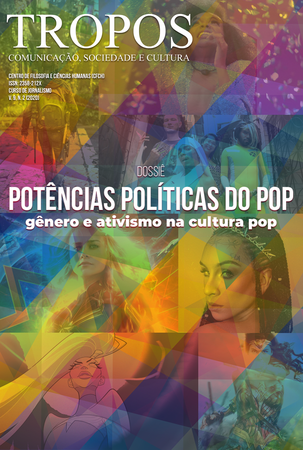HERÓIS SEM CAPA, VILÕES SEM MÁSCARA: O DISCURSO DE ÓDIO REPRESENTADO NA SÉRIE SUPERGIRL
Keywords:
Hatred, TV Series, Pop culture, GenderAbstract
The TV series Supergirl brought an innovation in its fourth season: the great villain that the heroine had to face was not an evil businessman or an ET with super powers, but the hatred. This narrative, therefore, can be perceived as a historically situated statement, which exposes contemporary fears. Based on this premise, this article aims to analyze how the production deals with the issue of hate speech, through a foucaultian speech analysis, which understands statements as rarities. The exam of the production was associated with theoretical contributions on hatred and its political use, in order to discuss whether the series was guided by a common sense view, or if it proposed a critical reflection on this topic. The investigation showed that the narrative provided a critical thinking about the mobilization of hatred, once it portrayed the phenomenon as a social problem and not merely an individual one. Regarding the representation of the group that mobilizes hatred and also the question of the adequate reaction to these attacks, however, the series ended up reinforcing stereotypes, such as the erasure of women’s active participation in hate groups and the imperative that movements against this emotion present themselves in a homogeneous way.
Downloads
References
ANJOS, Júlia. Megeras (in)domadas: discurso de ódio antifeminista nas redes sociais. Rio de Janeiro, 2019. Dissertação (Mestrado em Comunicação e Cultura). Escola de Comunicação, Universidade Federal do Rio de Janeiro, Rio de Janeiro, 2019.
ARISTÓTELES. Retórica das paixões. São Paulo: Martins Fontes, 2000.
BRUDHOLM, Thomas. Hatred as an attitude. Philosophical Papers, v. 39, n. 3, 2010. p. 289-313.
CHAUVAUD, Frédéric; GAUSSOT, Ludovic (Orgs.). La haine: histoire et actualité. Rennes: Presses Universitaires de Rennes, 2008
DAVIS, Angela. Women, race and class. New York: Vintage Books, 1983.
DOW, B. J. Hegemony, feminist criticism and the Mary Tyler Moore show. Critical Studies in Media Communication, v. 7, n. 3, p. 261-274, 1990
FOUCAULT, Michel. Arqueologia do saber. Rio de Janeiro: Forense Universitária, 2008.
FRAGOSO, Suely; RECUERO, Raquel; AMARAL, Adriana. Métodos e técnicas de pesquisa para Internet. Porto Alegre: Sulina, 2016.
FREVERT, Ute. Emotions in History: lost and found. Budapest: Central European University Press, 2011.
GAY, Peter. O cultivo do ódio. São Paulo: Companhia das Letras, 1995.
HOOKS, bell. Killing rage: ending racism. Nova Iorque: Owl Books, 1995.
KOLNAI, Aurel. The standard modes of aversion: fear, disgust and hatred. Mind, v. 107, n. 427, p. 581-596, 1998.
LEPOUTRE, Maxime. Rage inside the machine: Defending the place of anger in democratic speech. Politics, Philosophy & Economics, v. 17, n. 4, p. 398 426, 2018.
LEWIS, Clara S.. Tough on hate? The cultural politics of hate crimes. New Brunswick: Rutgers University Press, 2014.
LORDE, Audre. Eye to Eye: Black Women, Hatred, and Anger: Where does the pain go when it goes away? In: LORDE, Audre. Sister outsider: essays and speeches. Berkeley: Crossing Press, 1984.
LORDE, Audre. The Uses of Anger. Women's Studies Quarterly, v. 25, n. ½., 1997. p. 278 285.
LUTZ, Catherine. Unnatural emotions: everyday sentiments on a Micronesian atoll and their challenge to western theory. Chicago: The University of Chicago Press, 1988.
MEDEIROS, Amanda. “Devemos implodir o que resta de seus castelos”: o Movimento Brasil Livre (MBL) e a mobilização política de emoções. Tese (Doutorado em Comunicação e Cultura). Escola de Comunicação, Universidade Federal do Rio de Janeiro, Rio de Janeiro, 2020.
NUSSBAUM, Martha. Hiding from humanity: disgust, shame, and the law. Nova Jersey: Princeton University Press, 2004.
RENDALL, Jane. The origins of modern feminism: women in Britain, France and the United States 1780-1860. London: The Macmillan Press LTD, 1985.
SHOHAT, Ella; STAM, Robert. Unthinking Eurocentrism: multiculturalism and the media. New York: Routledge, 2014.
STANTON, Elizabeth Cady; ANTHONY, Susan B.; GAGE, Matilda Joslyn (Orgs.). History of Woman Suffrage, volume I. New York: Fowler & Wells, 1889.
STERNBERG, Robert J.; STERNBERG, Karin. The nature of hate. New York: Cambridge University Press, 2008.
SUNDÉN, Jenny; PAASONEN, Susanna. Shameless hags and tolerance whores: feminist resistance and the affective circuits of online hate. Feminist Media Studies, 2018.
SUPERGIRL, quarta temporada. Desenvolvida por Greg Berlanti, Andrew Kreisberg e Ali Adler. Netflix. 2018.
THORUP, Mikkel. Democratic Hatreds: The making of the hating enemy in liberal democracy. In: BRUDHOLM, Thomas; JOHANSEN, Birgitte Schepelern (Orgs.). Hate, politics, law: critical perspectives on combating hate. Oxford: Oxford University Press, 2018. p. 215 235
Downloads
Published
How to Cite
Issue
Section
License
Transferência de direitos autorais:
Declaro que após aprovado para publicação a Revista Tropos editada pela Universidade Federal do Acre (UFAC), passará a ter os direitos autorais do trabalho, que se tornarão propriedade exclusiva da Revista, sendo permitida a reprodução total ou parcial desde que devidamente referenciada.

